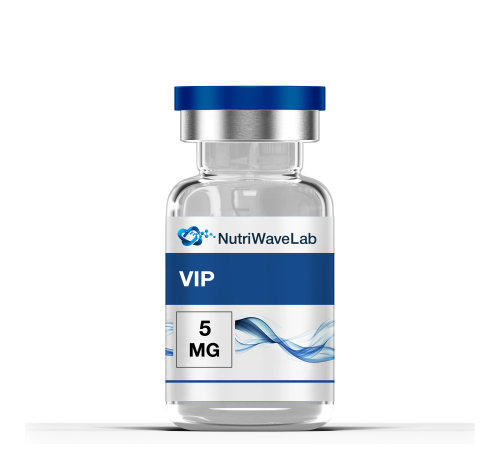
VIP Peptide (Vasoactive Intestinal Peptide): Comprehensive Overview
Introduction
Vasoactive Intestinal Peptide (VIP) is a neuropeptide that plays a significant role in a wide array of physiological processes. It is involved in vasodilation, bronchodilation, smooth muscle relaxation, and secretion of water and electrolytes in the gastrointestinal tract. Additionally, VIP has been studied for its regulatory effects on the immune system, energy metabolism, and cardiovascular system.
Clinical Benefits
VIP has been implicated in several medical conditions and offers potential therapeutic benefits:
• Gastrointestinal Disorders: VIP helps regulate smooth muscle activity and fluid secretion in the gastrointestinal tract, aiding in the treatment of conditions like irritable bowel syndrome (IBS) and Crohn’s disease.
• Respiratory Health: Due to its bronchodilatory effects, VIP has potential applications in treating respiratory disorders such as asthma and chronic obstructive pulmonary disease (COPD).
• Cardiovascular Health: VIP contributes to the regulation of blood pressure and heart rate, suggesting its use in managing hypertension and heart failure.
• Immune System Regulation: It has anti-inflammatory properties and modulates immune responses, making it a candidate for treating autoimmune diseases and inflammatory conditions.
• Neuroprotective Effects: Research indicates VIP’s potential in neuroprotection, particularly in preventing neurodegenerative diseases such as Alzheimer’s and Parkinson’s disease.
Mechanism of Action
VIP functions by binding to specific receptors (VPAC1 and VPAC2) on the surface of target cells. This interaction leads to the activation of adenylate cyclase and increased cyclic AMP levels within the cell, promoting the physiological effects associated with VIP, including:
1. Smooth Muscle Relaxation: VIP induces relaxation of smooth muscles in the airways and gastrointestinal tract.
2. Vasodilation: It promotes the widening of blood vessels, which can help reduce blood pressure and improve overall blood flow.
3. Enhanced Secretion: VIP stimulates the secretion of water and electrolytes in the digestive system and increases the production of saliva and pancreatic juices.
4. Immune Modulation: It modulates various components of the immune system, reducing inflammation and altering immune responses.
Research and Development
Ongoing research is exploring the therapeutic applications of VIP in greater detail, particularly its potential in treating inflammatory and autoimmune diseases. Clinical trials are assessing the efficacy and safety of VIP-based treatments across various conditions.
Usage
VIP is typically administered through injections or inhalation, depending on the target disorder. It is being formulated into various pharmaceutical products to maximize its stability and effectiveness in clinical use.
The Role of VIP in Osteoarthritis: A Potential Therapeutic Avenue
The Role of VIP in Gastrointestinal Disorders: Exploring Therapeutic Potentials
Introduction
Vasoactive Intestinal Peptide (VIP) is a neuropeptide with a significant role in modulating gastrointestinal function. It is known for its broad-spectrum activity in the digestive system, where it influences smooth muscle relaxation, secretion, and local blood flow. VIP’s involvement in various gastrointestinal processes makes it a subject of interest for potential treatments of several digestive disorders.
Impact on Gastrointestinal Health
VIP exerts multiple beneficial effects on gastrointestinal health, including:
• Enhancing Motility: VIP is crucial for promoting smooth muscle relaxation, which helps in regulating intestinal motility. This can alleviate symptoms of conditions like irritable bowel syndrome (IBS), where dysmotility is a common issue.
• Stimulating Secretions: It increases the secretion of water and electrolytes in the intestines, facilitating the digestion and absorption of nutrients. This property is particularly beneficial in managing conditions like Sjögren’s syndrome, where glandular function is impaired.
• Improving Blood Flow: VIP helps in regulating local blood flow within the gastrointestinal tract, which is essential for maintaining mucosal health and promoting the healing of ulcers.
• Modulating Immune Responses: Given its anti-inflammatory properties, VIP can modulate immune responses in the gastrointestinal tract, potentially benefiting inflammatory bowel diseases (IBD) such as Crohn’s disease and ulcerative colitis.
Mechanism of Action
VIP functions by binding to its receptors, VPAC1 and VPAC2, which are widely expressed throughout the gastrointestinal tract. Upon activation, these receptors initiate a cascade of intracellular events that lead to:
1. Smooth Muscle Relaxation: The activation of VIP receptors results in the relaxation of smooth muscles in the gastrointestinal tract, which can help alleviate spasms and pain associated with digestive disorders.
2. Increased Secretory Activity: VIP stimulates glands in the digestive tract to increase their production of digestive enzymes and fluids, enhancing overall digestive function.
3. Immune Modulation: Through its immunomodulatory effects, VIP can decrease the production of pro-inflammatory cytokines and increase anti-inflammatory cytokines within the gut, thus contributing to the maintenance of gastrointestinal homeostasis.
Research and Development
Current research is investigating the potential of VIP not only as a treatment for symptomatic relief but also as a preventive measure for chronic gastrointestinal diseases. Clinical trials are underway to assess the effectiveness and safety of VIP-related therapies in managing various gastrointestinal conditions.
Introduction
Osteoarthritis (OA) is a common and debilitating condition characterized by the degeneration of joint cartilage and remodeling of subchondral bone, leading to joint pain, swelling, and reduced mobility. Predominantly affecting the elderly population, OA’s etiology is linked with age, body weight, genetics, and mechanical stress. While current treatment modalities largely revolve around pain relief and lifestyle modifications, their limitations are significant, and joint replacement surgery is considered in severe cases. There is a pressing need for alternative therapeutic options to enhance the quality of life for patients with OA.
Potential Role of VIP in Osteoarthritis
Emerging evidence suggests that Vasoactive Intestinal Peptide (VIP) could play a crucial role in mitigating cartilage damage and joint remodeling associated with osteoarthritis. While the protective effects of VIP in OA are not fully understood, its role in rheumatoid arthritis and other inflammatory diseases highlights its potential therapeutic benefits. VIP, a neuropeptide with extensive anti-inflammatory properties, might offer a novel approach to managing OA by modulating immune responses and promoting tissue regeneration.
Mechanism of Action
VIP exerts its effects primarily through its anti-inflammatory and immunomodulatory activities. By interacting with specific receptors on immune cells, VIP can reduce the production of pro-inflammatory cytokines that are typically elevated in OA, thereby potentially slowing the progression of the disease. Additionally, VIP promotes the secretion of lubricating fluids in the joints, which helps to decrease friction and wear on the cartilage.
Research and Clinical Implications
Research into VIP’s role in OA is still in the early stages, but preliminary data are promising. Studies are needed to explore how VIP can be effectively integrated into existing OA treatment protocols, whether through direct administration or by enhancing the body’s natural production of VIP. Clinical trials are necessary to determine the efficacy and safety of VIP-based treatments, which could lead to new management strategies for osteoarthritis.
Conclusion
The vasoactive intestinal peptide (VIP) demonstrates substantial promise as a therapeutic agent due to its diverse physiological roles and potential health benefits. With ongoing research and clinical trials, VIP is poised to become an important tool in the management of several chronic and acute conditions, offering a new avenue for treatments based on its potent biological activities.
Product Use: THIS PRODUCT IS STRICTLY FOR
SCIENTIFIC RESEARCH PURPOSES ONLY. It should only be used in laboratory
settings. All product information on this website is provided solely for
educational purposes. The law strictly prohibits introducing this product into
the body of humans or animals. Only licensed professionals should handle this
product. This product is not a drug, food, or cosmetic and should not be
improperly classified or used as such.
There are no reviews for this product.
No questions about this product.
